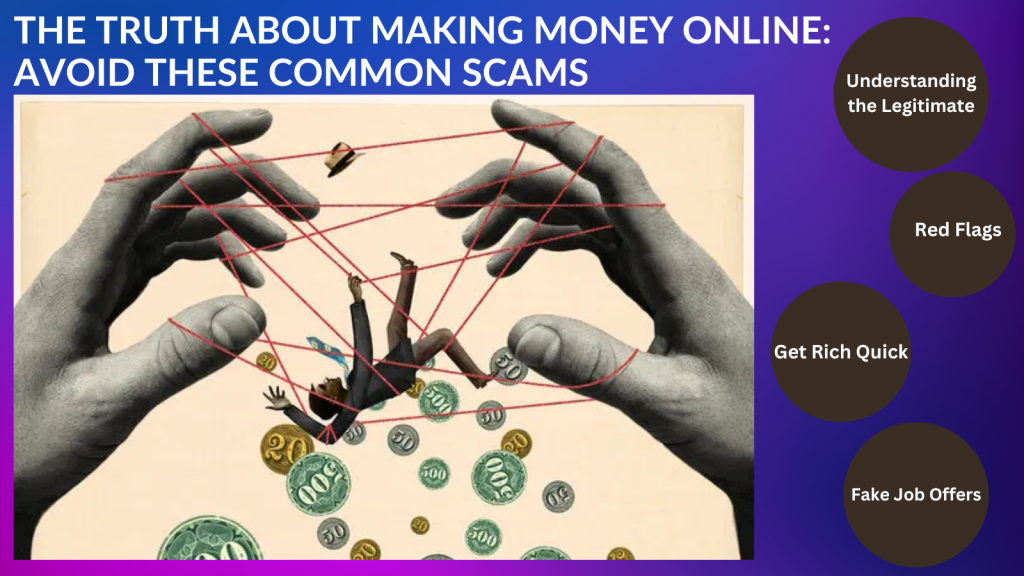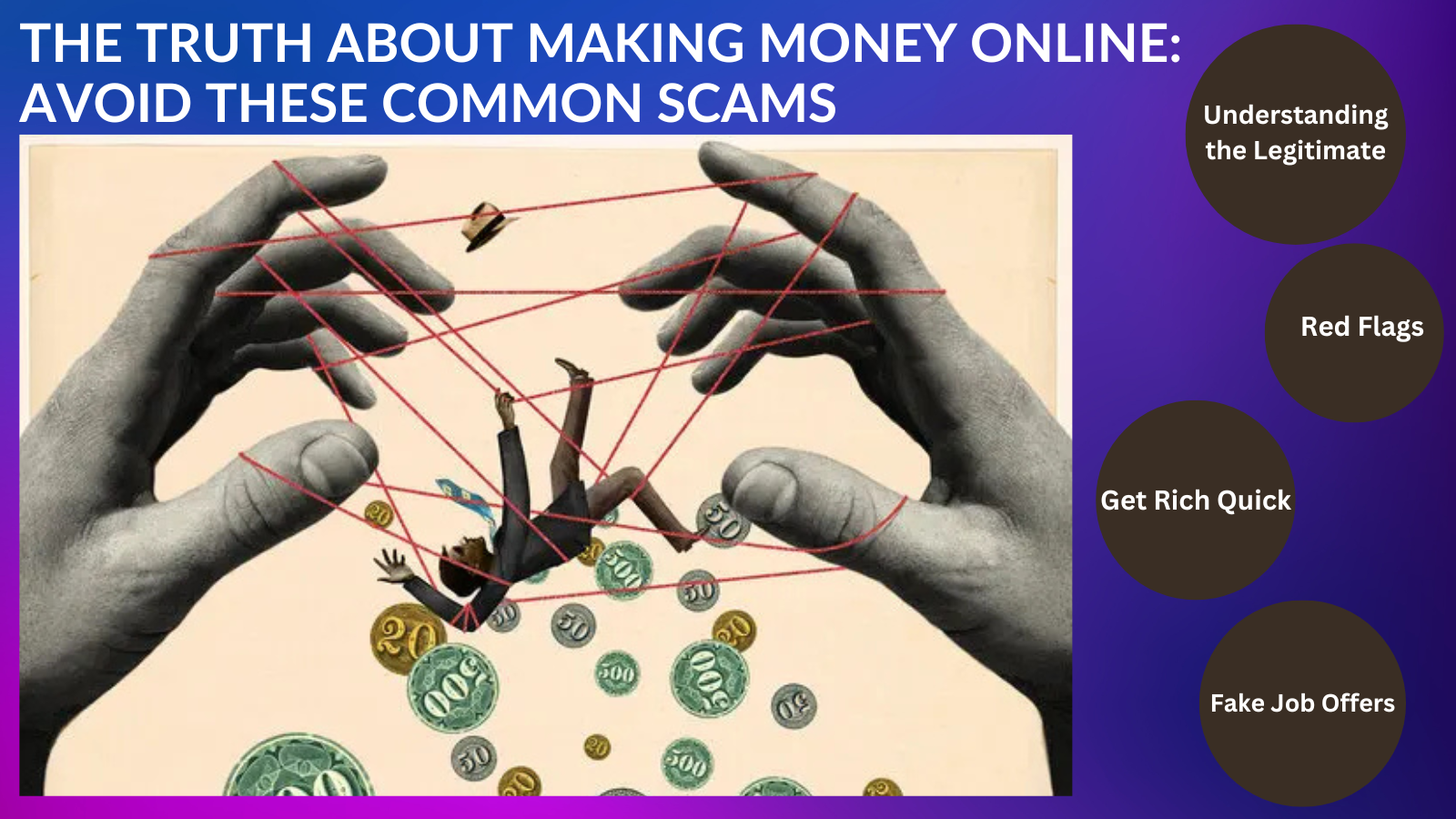Welcome to my article “The Truth About Making Money Online: Avoid These Common Scams”. Making money online sounds like a dream come true, doesn’t it? Imagine earning cash from the comfort of your couch, in your pajamas, with a cup of coffee in hand. The internet is filled with opportunities to generate income from home, and it’s no wonder that millions are eager to jump on the bandwagon. However, with the good comes the bad—like the numerous scams lurking in every corner of the web, waiting to catch the unwary.
While some online money-making ventures are as legitimate as they come, there are just as many fishy ones that promise big returns with little effort. You’ve probably seen ads boasting that you can “earn thousands from home with zero experience.” Sounds too good to be true? Well, that’s because it usually is. It’s easy to get swept up in the excitement of making money online, but knowing how to identify scams is just as important as knowing where to look for real opportunities. In this guide, we’ll help you spot these scams before you fall into their traps.
So, if you’re serious about earning money online but want to avoid the dreaded “too good to be true” pitfalls, grab a notebook (or a digital note-taking app, because, hey, we’re online here) and let’s dive into the truth about making money online. We’ll expose the most common scams, provide red flags to look out for, and offer tips to ensure you’re always on the right track. Ready to get started? Let’s go!
Access Our Proven Tested Formula for $50-$100 Daily Income – Watch This FREE Video >>

Understanding the Legitimate Ways to Make Money Online
Alright, let’s talk about the real deal—how to actually make money online without falling for a scam. There are plenty of ways to earn an honest income from home, but it’s all about knowing where to look and which paths to follow. So, let’s break it down and take a look at some of the most legitimate opportunities out there. Spoiler alert: they don’t involve mysterious ads claiming you can make $500 in an hour by clicking on links.
First up, let’s talk **freelancing**. If you have a skill—whether it’s writing, graphic design, web development, or even social media management—freelancing is one of the most reliable ways to make money online. Platforms like Upwork, Fiverr, and Freelancer connect you with clients from all over the world looking for specific services. The best part? You set your rates, choose the projects you want to work on, and work from the comfort of your own home (or anywhere with Wi-Fi, really). It’s like being your own boss, but without the overhead costs of a brick-and-mortar business.
Then, there’s **affiliate marketing**. If you’re someone who loves recommending products (and has an online presence, whether it’s a blog, a YouTube channel, or a popular Instagram account), affiliate marketing might be for you. It’s simple: you promote products and earn a commission when someone makes a purchase through your referral link. Now, let’s be clear—it’s not a “get rich quick” scheme. But with the right niche, good content, and consistent effort, it can bring in a steady income over time. Plus, it’s a great way to make money while you sleep, as affiliate links work 24/7 for you.
Another fantastic way to earn online is by **selling digital products**. If you’ve got a knack for creating things like eBooks, courses, printables, or even photography, you can sell your creations on platforms like Etsy, Gumroad, or Teachable. Digital products don’t require inventory, shipping, or a storefront—once you’ve made the product, it’s all about marketing it to the right audience. And let’s not forget the best part: once you’ve put in the effort to create a high-quality product, it can keep earning you money passively for years.
These are just a few of the many legitimate ways to make money online. The trick is doing your research, investing time in building your skills, and staying away from the “too good to be true” opportunities. So, if you’re ready to roll up your sleeves and get to work, there are countless ways to earn a real income from the comfort of your home—no scams necessary!
Red Flags: How to Spot an Online Scam
Now that we’ve talked about the legitimate ways to make money online, let’s get down to the business of spotting the red flags that signal a scam. Because, let’s be honest, there are more than a few sketchy offers out there that will make you want to question humanity (and your internet connection). But don’t worry—we’ve got you covered. With these warning signs, you’ll be able to tell the difference between a real opportunity and a scam faster than you can say “too good to be true.”
1. Unrealistic promises
If an online opportunity promises you can “earn thousands of dollars a day with zero effort,” that’s your first clue that something fishy is going on. In the real world, making money takes time, effort, and skill. No one is going to hand you a paycheck for doing absolutely nothing (unless you’re royalty, but even they have to show up for some meetings, right?). Legitimate online jobs or businesses require work, and while they can be lucrative, they’re not magic. So, if the ad sounds like it was written by a wizard with a get-rich-quick spellbook, it’s time to run in the opposite direction.
2. Requests for upfront payments
A major red flag: If a website or job offer asks you to pay them before you can get started—whether it’s for a “special report,” “training program,” or “membership fee”—that’s a scam. While some legitimate companies might charge for specific services or products (like a course or software), scams often ask for upfront fees with little to no explanation of what you’re actually getting in return. Think of it like paying someone before you’ve even seen the product—it’s a one-way ticket to getting scammed. Real businesses don’t operate this way.
Access Our Proven Tested Formula for $50-$100 Daily Income – Watch This FREE Video >>
3. Vague or non-existent contact information
If you’re looking into an opportunity, and you can’t find any clear contact info (like an address, phone number, or even an email), that’s a huge warning sign. Scammers love hiding behind fancy websites with no real traceable presence. Take a look at the “About Us” page—if it’s filled with generic buzzwords or the company seems to have no clear location or leadership, consider it a red flag. A legitimate business should be proud to share who they are, where they’re based, and how you can reach them if something goes wrong.
4. Too much pressure to act fast
A classic scam technique is creating a sense of urgency. “Hurry! Only 5 spots left!” or “Sign up now, or this exclusive offer will be gone forever!” Sure, some deals are time-sensitive, but a legitimate offer won’t pressure you into making decisions that fast. If a website is pushing you to make a snap decision with promises of limited-time opportunities, it’s a sign that they’re probably more interested in getting your money than delivering value. Real opportunities give you time to think, do your research, and decide if it’s right for you.
5. Poor website design or an unprofessional appearance
Let’s face it: A website that looks like it was designed in 1998 or has spelling errors on every page is not the type of platform you want to trust with your personal or financial information. While it’s true that not every scam site looks like it was made by a 12-year-old, many of them do have a certain “off” feel. If the site looks unprofessional or there are inconsistencies (like weirdly broken links, strange images, or hard-to-read text), it’s a big indicator that the people behind it might not be who they claim to be. Always look for signs of professionalism—secure payment methods, clear navigation, and error-free content are good signs of a legitimate operation.
Common Online Scams to Avoid
Alright, now that you’ve learned how to spot a scam, it’s time to dive into the specifics—the kinds of online scams you’ll likely encounter on your quest to make money online. And believe me, these scams are as sneaky as a cat in a room full of laser pointers. They’ll show up looking legit, offering great deals, but once you bite, you’ll quickly realize you’ve been duped. So, let’s break down some of the most common online scams that you’ll definitely want to avoid.
1. “Get Rich Quick” Schemes
The classic “get rich quick” scam is like the high school prom king of internet fraud—it’s everywhere. You’ve probably seen those ads claiming you can make thousands of dollars a day from the comfort of your couch with minimal effort. They might promise you’ll be living the life of luxury within weeks, with nothing more than clicking a few buttons. Spoiler alert: It’s a trap. These scams often lead you to fake investment platforms, multi-level marketing (MLM) schemes, or sketchy affiliate programs that require you to recruit others into the “business” rather than actually offering any real product or service. Bottom line? If they promise you fast cash with little work, it’s time to close that tab and run.
2. Fake Job Offers
Looking for a remote job can be exciting, but it can also open the door to some seriously shady offers. Fake job scams often ask you to pay upfront for a background check, training materials, or software. They’ll tell you that this “small investment” is necessary for your role, but the only thing you’ll be investing in is their pocket. Once they’ve got your money, they’ll either disappear or keep asking for more. Legitimate companies will never ask you to pay them to work for them. If an online job sounds too good to be true (e.g., “Earn $50/hr with no experience!”), that’s your cue to dig deeper and proceed with caution.
3. Online Survey Scams
We’ve all seen those pop-ups that promise to pay you for answering a few surveys. While legitimate survey sites like Swagbucks or Survey Junkie can earn you a little extra cash, some scams try to lure you in with promises of big rewards for minimal work. These scams often require you to sign up with your credit card or make a small payment for “access” to exclusive survey opportunities. Once you’ve paid, you’ll either find the surveys are a waste of time or, worse, they’ll try to upsell you on other bogus offers. Remember, real survey companies don’t require upfront fees, and they’ll never ask for your payment details unless you’re redeeming rewards.
4. Investment Scams
Online investment scams are another sneaky culprit that tries to separate you from your money. Whether it’s cryptocurrency, forex trading, or even “surefire” stock picks, scams in this space often promise huge returns with little risk. The scammer might offer you an “exclusive” opportunity, claiming they have insider knowledge of a certain investment that’s going to make you rich. Once they have your money, they either disappear, or you’re left with a worthless investment that you’ll never see again. If someone’s promising guaranteed returns or urging you to act fast before a “once-in-a-lifetime” deal disappears, it’s a major red flag. Legitimate investments take time and come with inherent risks—anyone telling you otherwise is likely trying to pull a fast one.
Access Our Proven Tested Formula for $50-$100 Daily Income – Watch This FREE Video >>
5. Multi-Level Marketing (MLM) Schemes
MLM schemes are a bit of a gray area because they’re technically legal—but don’t let that fool you. Many MLM companies disguise themselves as “legitimate businesses,” where you’re encouraged to recruit others to sell a product while earning commissions. The catch? The real money is often made from recruitment, not from actual product sales. These companies are structured like pyramids, with a few people at the top raking in the profits while the rest of the participants struggle to break even (if they even make anything at all). Think of it like a pyramid scheme with a fancy new name—if they’re asking you to pay for a starter kit and recruit others, it’s probably not the money-making opportunity they’re selling it as.
Protecting Yourself from Online Scams
Alright, now that you know how to spot the signs of a scam, let’s talk about how to protect yourself from falling victim to one. Because let’s face it, the internet can sometimes feel like the Wild West—there are gold nuggets (legitimate opportunities) and plenty of bandits (scammers) trying to pull a fast one on you. But don’t worry! With a little awareness and some common-sense precautions, you can navigate the online world safely and keep your hard-earned cash where it belongs—right in your pocket.
1. Use Secure Payment Methods
When it comes to paying for online services or products, always choose secure payment methods. Credit cards, PayPal, and other trusted payment systems offer fraud protection and can help you recover your money if something goes wrong. Avoid wiring money directly or using methods like gift cards, which are common tactics in scams. If the website or service is only offering to take payment through obscure or untraceable methods, that’s a major red flag. Secure payment methods won’t just protect your wallet—they’ll also make it easier to dispute any unauthorized charges if things don’t go as planned.
2. Do Your Research
When you come across a tempting online opportunity, take a minute (or five) to do some digging before diving in. A little research goes a long way. Look for online reviews, search for any complaints or scam reports, and check out the company’s history. A quick Google search can reveal whether other people have had positive or negative experiences. Also, check if the website is professionally designed, if contact info is available, and if the business has any kind of online presence, such as social media profiles. Scammers often keep a low digital footprint, so a lack of credibility online is a huge red flag. Trust your instincts—if it feels off, it probably is.
3. Protect Your Personal Information
When you’re exploring ways to make money online, you’ll need to share some personal information, like your email, phone number, or even bank details. But here’s the thing: always be mindful of who you’re sharing it with. If you’re asked to share a lot of personal info for something that seems too easy or too good to be true, take a step back. Legitimate companies don’t need access to your social security number, passwords, or private financial accounts unless you’re signing up for something major (and even then, look for encryption and secure forms). Always make sure the website you’re interacting with has proper security (like an “https” in the URL), and never give out sensitive information to a site you don’t fully trust.
4. Be Skeptical of Unsolicited Offers
Have you ever gotten an email, text, or message on social media from someone offering you a “once-in-a-lifetime” opportunity? They promise big rewards in exchange for a small investment or quick action. It’s tempting, right? But here’s the thing: legitimate businesses don’t cold-call or cold-email random people with offers that seem too good to be true. If you receive unsolicited messages, especially ones that sound urgent or high-pressure, it’s probably a scam trying to get you to act impulsively. Take your time to verify any unsolicited offers. Scammers count on your excitement and urgency to push you into making a hasty decision—so don’t fall for it.
5. Set Up Alerts and Monitor Your Accounts
When you’re taking steps to protect yourself from scams, it’s always a good idea to set up alerts for your bank and credit accounts. Many banks and payment services let you monitor your transactions in real time, which can help you catch fraudulent activity early. If you notice any charges that don’t look familiar, you can act quickly to resolve the issue. Setting up two-factor authentication on your accounts adds an extra layer of protection, making it harder for scammers to steal your personal info, even if they manage to get your password.
6. Don’t Get Too Comfortable
While the internet offers plenty of amazing opportunities, it’s important to always stay on your toes. Scammers are constantly coming up with new, creative ways to trick you into giving up your money or personal information. By staying vigilant, following the tips above, and keeping your guard up, you can ensure that your online experience stays safe and scam-free. Just because a website looks legitimate doesn’t mean it is—so make sure to verify everything, and don’t let convenience or excitement cloud your judgment.
How to Safely Start Your Online Money-Making Journey
So, you’re ready to dive into the world of online money-making—awesome! The internet is a treasure trove of opportunities, and with the right approach, you can start earning money from home (or anywhere with Wi-Fi, really). But before you start getting too excited about all the potential ways to make cash, it’s important to take a step back and lay the groundwork for success. You wouldn’t dive into a pool without checking if the water’s warm, right? Same goes for online opportunities. Here’s how you can safely start your online money-making journey and avoid stepping into a digital minefield.
1. Start with What You Know (Or What You’re Willing to Learn)
The first step in your online money-making journey is to get real with yourself about what skills you already have—or what skills you’re willing to learn. If you’re a whiz at writing, freelance writing could be a great option. If you’ve got a knack for graphic design, websites like Fiverr or Upwork could be your ticket to freelance success. But maybe you don’t have a particular skill yet, and that’s perfectly fine! There are plenty of opportunities to learn new things online, whether it’s through free courses on platforms like Coursera or YouTube tutorials. Just make sure you’re committed to learning and improving your skills—because building an online income takes time, and you’ve got to be ready to put in the effort.
2. Set Realistic Expectations
While it’s true that some people make a lot of money online, it doesn’t happen overnight. Get-rich-quick schemes rarely lead to real, sustainable income. So, set realistic goals from the start. Whether you’re looking to make a full-time income or just some extra spending cash, figure out how much time and effort you can realistically dedicate to your online venture. Start small, and as you gain experience and confidence, you can increase your earnings. Set a goal to earn a certain amount each week, and track your progress. Having a clear and achievable goal will help you stay motivated and avoid getting discouraged by the slow start that often accompanies building an online business.
3. Choose the Right Platform (And Do Your Homework)
You wouldn’t open a lemonade stand on a busy freeway, right? The same logic applies to choosing the right platform to launch your online money-making journey. Whether you’re freelancing, selling products, or affiliate marketing, make sure you choose a platform that aligns with your skills and goals—and, of course, one that’s trustworthy. Research the platform’s reputation, read user reviews, and understand the fees and commissions involved. For example, if you’re freelancing, sites like Upwork and Fiverr are popular and well-established. If you’re looking to sell digital products, platforms like Etsy or Gumroad are solid choices. Just remember: Not all platforms are created equal, so take your time to pick the best one for you.
4. Build a Strong Online Presence
The beauty of online money-making is that you don’t need to rent office space or print up business cards—but you do need an online presence. Whether you’re offering services, selling products, or creating content, you need a way for people to find you and know you’re credible. A basic website or portfolio is a great place to start, even if it’s just a simple blog or an online store. Social media is also a fantastic tool for building your brand and connecting with potential clients or customers. LinkedIn, Instagram, and Facebook can help you build a community and showcase your work. The more professional and consistent your online presence, the easier it will be for people to trust you—and that’s key when it comes to making money online.
5. Be Smart About Your Finances
When you start making money online, it’s easy to get caught up in the excitement of seeing your first paycheck roll in. But before you start spending your earnings on new gadgets or a celebratory dinner (or two), take a moment to think about your finances. For one, make sure you’re setting aside money for taxes. Depending on where you live, online income may be taxable, and it’s always better to be prepared than to be hit with an unexpected tax bill at the end of the year. Also, consider reinvesting some of your earnings into your business. Whether it’s for courses, tools, or marketing, reinvesting in yourself and your skills is a great way to grow your online income over time. Finally, keep track of all your earnings and expenses with accounting software or a simple spreadsheet to stay organized and on top of your finances.
6. Stay Consistent and Keep Learning
The key to success in making money online is consistency. Whether you’re freelancing, selling products, or running an affiliate marketing business, consistency is what will help you build momentum. Don’t expect to see massive returns immediately. Instead, focus on putting in the work every day (or week) and refining your process as you go. The more you learn and adapt, the better you’ll get at what you’re doing, and the more money you’ll make over time. And never stop learning! The online world is constantly evolving, so keep up with industry trends, learn new tools, and stay open to changing your approach as you gain experience.
Conclusion:
And there you have it—the ultimate guide to making money online, complete with tips, tricks, red flags, and actionable steps to ensure you’re on the right track. Now, I know it might feel a little overwhelming, but trust me, with the right mindset and a bit of patience, the internet can be your playground for financial freedom. The key is to stay informed, be cautious, and take it one step at a time.
Remember, the world of online opportunities is vast, and while it’s full of possibilities, it’s also full of pitfalls. There are plenty of scams and shady characters waiting to steal your time and money, but with the knowledge you’ve gained from this article, you’re now equipped to spot them from a mile away. From recognizing the telltale signs of a scam to protecting your personal information, you’ve got all the tools you need to stay safe.
Access Our Proven Tested Formula for $50-$100 Daily Income – Watch This FREE Video >>
But here’s the best part: The opportunities are real! Whether you’re looking to freelance, sell products, offer services, or create content, the online world is brimming with legitimate ways to earn money. The trick is to approach it with a blend of optimism and caution. Don’t rush into anything that feels too good to be true, but also don’t be afraid to try new things and experiment until you find your perfect fit. It’s a journey, not a sprint, and every step you take will bring you closer to your goals.
So, go ahead and dive in—safely, strategically, and with a whole lot of confidence. Start small, stay consistent, and over time, you’ll be amazed at how much you can achieve. The world of online money-making isn’t reserved for a select few; it’s open to anyone who’s willing to put in the work. And who knows? With the right approach, you could be the next success story in this ever-evolving online world.
Now, get ready to take on the internet with a smile on your face and a solid plan in place. Your online money-making journey is waiting, and with your new knowledge, there’s nothing stopping you from making it a success! Keep learning, keep adapting, and most importantly, keep hustling. Your future self will thank you.
Thanks a lot for reading my article on “The Truth About Making Money Online: Avoid These Common Scams” till the end. Hope you’ve helped. See you with another article.










